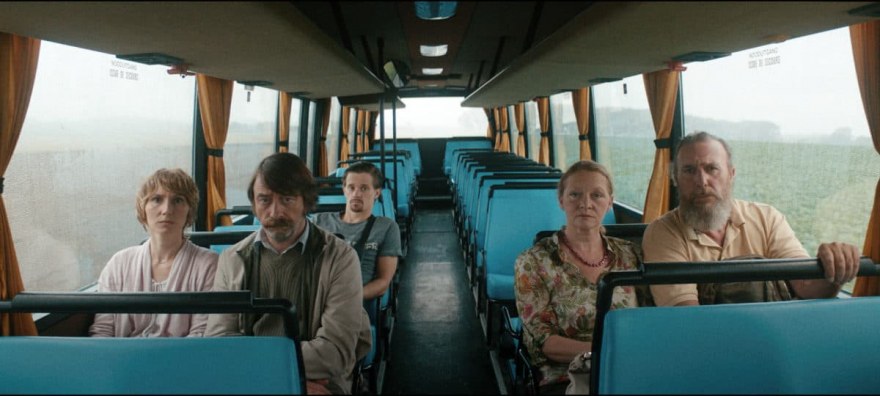Breakfast with Vihta
Interview with François Bierry, director of Vihta
How did you come up with the idea for this very curious company outing?
I wanted to make a film about the company. And one day, my partner and I went to a spa in Flanders. We went to the nudist part. In the jacuzzi, there were people of different ages talking, among themselves, about their company’s accounting. They were all colleagues. I found it extraordinary that a company would organize an outing for its employees where everyone had to be nude. That was a great premise for a film.
Are you interested in questions about power relations and do you see yourself making other films on the subject?
I like characters who stand up for themselves after they’ve been stepped on. I like the idea of resistance, even if it’s futile. Especially nowadays when it’s less and less fashionable to struggle.
Why were you interested in the relationship of intimacy and modesty?
I use the conflict of nudity and modesty because it allows me to take a humourous approach to the cult of tyranny and transparency, that insidious obligation to the truth, to stripping things bare that big companies use from the top down. The idea of modesty is cultural, feelings about nudity are very different in Nordic countries versus Latin countries. Playing with that notion is exhilarating for a comedy; it allows you to show a whole lot of things in the context of a company outing – Are you ready to get buck naked to keep your job?
What is your background in the western genre personally and in Vihta?
I’m a big fan of westerns be they traditional or spaghetti westerns. They have everything: time, space, movement, conflict, tension, action, duels. And violence too. The business world is much more violent than most westerns. The number of suicides that occur in the workplace is staggering. Not to mention the number of burn-outs. In the film, especially for the climactic scene, I injected some codes from the western, in particular the duel. A slightly absurd stand-off between an employee and an authority figure.
What do you think of the contemoprary workplace?
Individualism has destroyed the notion of body. The idea of a working class has disappeared even though nowadays there are clearly two worlds. Uber is one more step towards individualization – we’re dismantling the last social protections under the pretext of fighting unemployment. Work has become so unstable that people are willing to work more for less. The threat of unemployment pushes young and old to accept things we couldn’t have imagined even twenty years ago.
Are the younger generations more adaptable to these pressures? Are the older generations more apt to resist them?
I don’t think it’s a question of age or generation but of the context that’s in place.
Have you discovered any advantages that the short film form provides?
I do an enormous amount of preparation for my films, but I still leave space to play around, because I want to have good surprises during filming. I would like to have shot on film, but at the last minute we were unable to because of a small budget issue. For a feature film, I think that would be even more complicated. The short form allows you to try things out, to mess up, whereas in a feature, the stakes are so high that there are other types of pressure. But I hope to work the same way on my first feature film as I do on my short films.
If you’ve already been to the Clermont-Ferrand Festival, can you give us an anecdote? If it’s your first time, what are you expecting at the Festival?
First time. I hope to meet great people, see some incredible films, talk to some players!
Vihta is part of National Competition F5.








